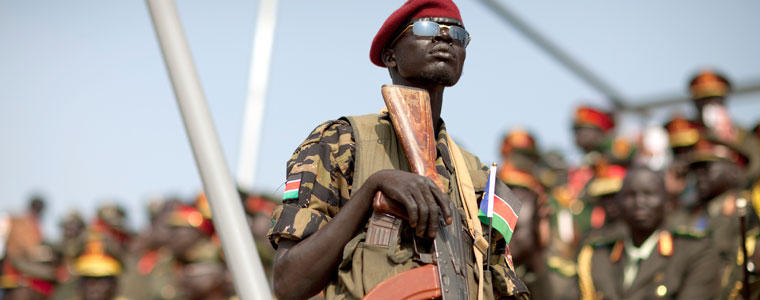Director of USIP's Two Sudans program, Jon Temin, reflects on the birth of the world's newest nation, South Sudan, and looks ahead to 2012 and USIP's continued impact in the region.

The past year has been momentous for Sudan -- and the world's newest nation, South Sudan. Briefly describe the current situation there.
2011 witnessed the conclusion of Sudan’s Comprehensive Peace Agreement and the long-awaited referendum on the secession of South Sudan. The referendum process was a remarkable success. Many predicted that it could lead to renewed civil war, but the process was peaceful and orderly and the outcome – an overwhelming vote for secession – clearly reflected the will of the people of South Sudan. Unfortunately, after the referendum in January the situation in both Sudan and South Sudan (which had its formal independence in July) deteriorated.
There has been violence in the disputed Abyei region along the new international border, as well as in Southern Kordofan and Blue Nile states, both in the remaining Sudan but inhabited by some groups aligned with South Sudan. The border area between Sudan and South Sudan looks likely to be volatile for years to come. Meanwhile, Sudan and South Sudan are locked in negotiations over the terms of their split, most notably how to share oil revenue and infrastructure, with negotiations set to resume in January.
2011 also saw the signing of the Doha Document for Peace in Darfur (DDPD), a new peace agreement for Sudan’s troubled western region signed by the government and one armed movement. There is a good deal of skepticism about the parties’ commitment to the DDPD and whether it can improve the lives of long-suffering Darfuris – it remains to be seen whether that skepticism will be proven wrong in 2012.
How has USIP been involved in Sudan in 2011?
USIP remains heavily involved in both countries. In the run-up to the referendum we conducted a series of referendum violence prevention workshops throughout Sudan to prepare people for the vote, and USIP staff served as referendum monitors. Since the birth of South Sudan we have published a series of reports on critical aspects of state building in the new country.
We are currently leading a series of facilitated dialogue sessions between police and communities in some of the most volatile parts of South Sudan. To support democratization in both Sudan and South Sudan we are lending support to the processes of developing new constitutions in both countries – crucial processes that can help define the principles of both nations. We are also working to stabilize the volatile border area between the two countries through our grants program, and are working with communities along a vital grazing corridor that traverses that border.
In addition, in November we hosted a high-level workshop on the ongoing Darfur peace process and the DDPD that brought together some of the major armed movements and representatives of the key government and institutions working to end violence in Darfur.
What developments can we be expect to see in Sudan in 2012 -- and how will USIP play a role?
One of the important things to watch in early 2012 will be whether Sudan and South Sudan can conclude negotiations on the outstanding issues between them, including oil. The longer those negotiations last the further relations between the countries are likely to deteriorate. The economy in Sudan is in bad shape and stands to benefit from a settlement. The economic situation is fueling discontent in many parts of Sudan, with a coalition of armed movements vowing to change the regime. In 2012 we will be watching to see if these armed groups are willing to negotiate with the government, and whether the government is willing to engage in a genuine, inclusive constitutional development process. The disputes in the “three areas” – Abyei, Southern Kordofan and Blue Nile – also require urgent resolution given the humanitarian toll of fighting in those areas in 2011.
USIP will continue to support peacemaking efforts on all of these fronts, with the police-community dialogues expanding, further engagement on constitution-making in Sudan and South Sudan, the continuation of our grant-making North-South Border Initiative focused on the new international border, support to implementation of the DDPD, and several timely and policy-relevant publications to be released early in 2012. Through these efforts we will support conflict resolution and reconciliation within and between the two Sudans.



